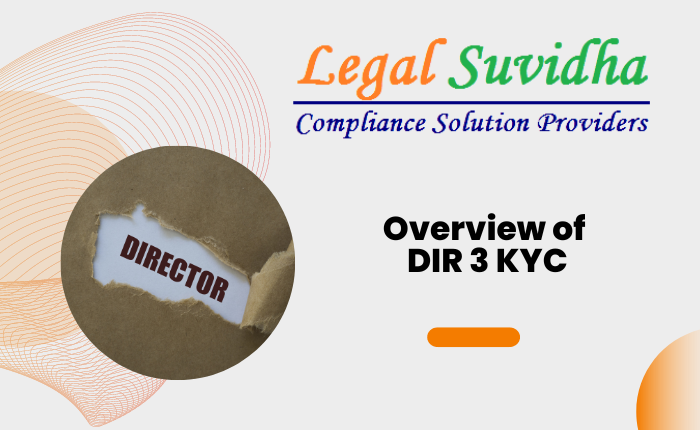The Director Identification Number (DIN) holds paramount significance for both aspiring and incumbent directors within a corporate entity. In the past, securing a DIN necessitated a one-time application through Form DIR-3. However, the Ministry of Corporate Affairs (MCA) has ushered in a new requirement for annual Know Your Customer (KYC) filing for all DIN holders through the implementation of Form DIR-3 KYC. This comprehensive article delves meticulously into the intricacies of the DIR-3 KYC, encompassing its legal framework, applicability criteria, various categories, associated fees, and imperative guidelines for seamless submission. It’s important to note that the deadline for filing DIR-3 KYC falls on the 30th of September each year.
Legal Provisions:
The imperative mandate for Form DIR-3 KYC emanates from the regulatory framework of Rule 12A, along with Rules 11(2) and (3) of The Companies Appointment and Qualification of Directors Rules, 2014.
- Rule 12A stipulates that individuals holding a DIN as of March 31st are obliged to submit Form DIR-3 KYC by September 30th of the subsequent financial year.
- Simultaneously, Rule 11(2) empowers the Central Government to deactivate a DIN if the concerned director fails to furnish their particulars within the prescribed timeframe.
- Rule 11(2) outlines that the Central Government, Regional Director (Northern Region), or duly authorized officials hold the authority to deactivate a Director Identification Number (DIN) if the individual fails to submit the requisite information via e-form DIR-3-KYC or web service DIR-3-KYC-WEB within the stipulated time, as per Rule 12A.
Applicability of DIR-3 KYC:
- The requirement to file DIR-3 KYC extends to holders of a DIN, provided their DIN was allocated on or before March 31st.
- Additionally, the obligation for KYC submission applies under certain circumstances: a DIN holder bearing disqualification status, one without any directorships, an individual with a solely designated partnership within an LLP, or a DIN holder who has never utilized their DIN for any corporate or LLP engagement.
- Notably, a DIN holder who obtained their DIN after March 31st is exempt from filing the KYC form for the corresponding financial year.
Types of DIR-3 KYC:
The form is bifurcated into two categories:
i. Form DIR-3 KYC:
– Initial KYC filing
– Modification of mobile number or email address
ii. Web DIR-3 KYC:
– Pertains to DIN holders who have previously submitted Form DIR-3 KYC in any prior financial year and necessitate no updates to their KYC details. This streamlined process involves utilizing the DIR-3 KYC web service for annual verification, ensuring consistency with the data provided in the previous year’s form.
Fee Structure for DIR-3 KYC:
Compliance within the stipulated timeframe: No fee is levied when Form DIR-3 KYC is submitted within the designated deadline of the respective financial year.
Submission beyond the due date: However, in cases of filing after the due date, where the DIN status is ‘Deactivated due to non-filing of DIR-3 KYC,’ a fee of INR 5000 is chargeable.
Vital Guidelines for Form DIR-3 KYC Filing:
– Each DIN holder must employ a unique personal mobile number and email address. These contact details are subject to verification through a one-time password (OTP).
– The digital signature of the director is obligatory when submitting the Form DIR-3 KYC. In contrast, the Web DIR-3 KYC does not necessitate a digital signature.
– Notably, Form DIR-3 KYC mandates the use of a digital signature for both directors and professionals. Conversely, the Web KYC procedure does not require a digital signature from any party.
– The essential details to furnish within Form DIR-3 KYC include the Director’s Name, Father’s Name, Date of Birth, Nationality, PAN Number, Passport Number (if applicable), Aadhar Number, Personal Mobile Number, Personal Email ID, Present Residential Address (with supporting evidence), and Permanent Residential Address (with supporting evidence).
In conclusion, this comprehensive exposition scrutinizes the Director Identification Number (DIN) and its associated annual KYC filing requirement through Form DIR-3 KYC.
If You have any queries then connect with us at [email protected] or [email protected] & contact us & stay updated with our latest blogs & articles










